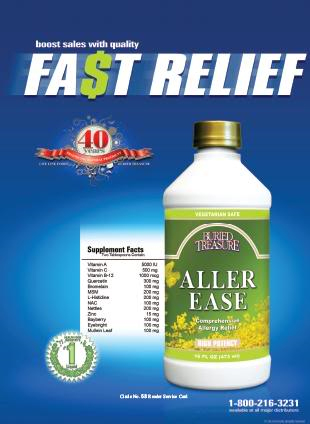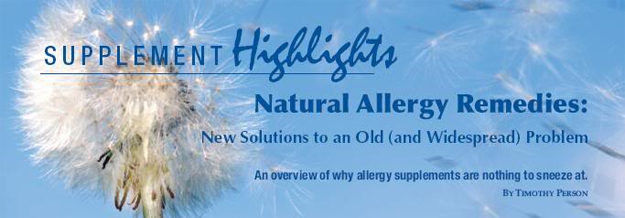You can try holding your breath, but when you finally inhale seasonal allergies will be there waiting. The question is how best to address them. When it comes to allergy relief, we can safely replace old wives’ tales with real facts. Many natural remedies have substantiated benefits for allergy and asthma sufferers.
What Is an Allergic Reaction?
Taken as a combined statistic, allergy and asthma sufferers represent the largest illness group in the United States. Allergies alone far outstrip other ailments, like heart disease and diabetes, in terms of the number of people they affect yearly (1). Seasonal or outdoor allergies, caused by pollen and other airborne allergens, have always been common, and some studies show their prevalence is increasing (1). These seasonal reactions are a type of allergic rhinitis, which is estimated to afflict 35–60 million Americans annually (2). Asthma is notoriously difficult on large numbers of children, with the Centers for Disease Control and Prevention reporting that nearly 10% of children are diagnosed as asthmatic in the United States (3).
 Allergic reactions are, simply, the outward symptoms of an immune system disorder. In those with sensitivities to airborne allergens like pollen, for example, the immune system overreacts to the inhaled substance, causing the release of histamines, which in turn cause the runny nose, itchy eyes and other symptoms (1). This type of allergy, also known as hay fever, flares up for many people in the fall months, when airborne allergen levels tend to spike.
Allergic reactions are, simply, the outward symptoms of an immune system disorder. In those with sensitivities to airborne allergens like pollen, for example, the immune system overreacts to the inhaled substance, causing the release of histamines, which in turn cause the runny nose, itchy eyes and other symptoms (1). This type of allergy, also known as hay fever, flares up for many people in the fall months, when airborne allergen levels tend to spike.
Asthma involves the swelling of respiratory airways, a reaction triggered by environmental factors, which leads to asthma’s trademark serious symptoms of shortness of breath and wheezing. The root causes of asthma remain somewhat mysterious to scientists, but the tendency to develop it seems to be heritable. There is also the so-called “hygiene hypothesis”: our over-sanitized, modern childhoods can block immunity-developing exposure, thus increasing the likelihood of asthma (4). Whatever the cause, asthma can be a source of great discomfort and can be life-threatening.
Medicating the Symptoms
Over-the-counter (OTC) medication is the time-honored solution for relieving allergic and asthmatic reactions alike. Forms of traditional treatment run the gamut from oral antihistamine pills to nasal sprays to help stem the tide of symptoms.
There are, however, drawbacks to OTC and prescription medications. Most antihistamines you can find at the drug store may cause unwanted drowsiness. Some of the side effects are so pronounced that these medications have been implicated in teen misuse. They may help you get to sleep, but when you’re trying to get past allergy symptoms to get on with your day, that drowsiness will be counterproductive. Decongestants, meanwhile, are meant to reduce the inflammation caused by allergic reactions. But, repeated use of certain decongestants can actually be problematic. Decongestants have also been found to raise blood pressure in some cases, and to affect sleep patterns and even your mood (5).
Asthma often is treated with bronchodilators (usually hand-held inhalers). Long-term medications, such as corticosteroids, are also usually an important part of managing life with asthma. The worlds of allergies and asthma overlap when asthma is treated with allergy medication, because some individuals’ asthmatic reactions are actually being triggered by allergic reactions.
Long-term and rescue medication are usually an indispensable lifeline for serious asthma sufferers. But, there remains room for natural treatment options in managing a case of asthma, which could lead to less frequent attacks, meaning a decreased dependency on that inhaler. Likewise, the downsides to frequent use of traditional allergy medications, along with the proactive, holistic health benefits of certain alternatives, point up the benefits of using those alternatives to deal with allergies.
Getting at Allergy’s Roots
The first thing to note about a natural approach to addressing allergy problems is how it will differ from the pharmaceutical approach. Many natural solutions are geared toward keeping immune system reactions in check. Since seasonal allergies are a disordered response to harmless particles, it makes perfect sense to try to alleviate the cause of the problem, instead of simply medicating the symptoms (6).
 One emerging player in the growing array of natural allergy solutions is folic acid. Recent research backs the possibility that folic acid could hinder the effects of allergic and asthmatic reactions when taken in supplement form. A study last year from the Johns Hopkins Children’s Center solidified the status of folic acid as an anti-inflammatory substance (7). Since inflammation, mostly of the nasal membrane, is responsible for the symptoms of allergies, taking folic acid may help lessen those symptoms. Even more interesting is the prospect, indicated by the study, that high folic acid levels may help to correct the immune system’s response to allergens in the first place. People with high folate levels in their blood had low levels of a specific antibody that shows up in response to allergens (7). This is an exciting new example of the way a natural supplement can work to correct allergic states in the immune system.
One emerging player in the growing array of natural allergy solutions is folic acid. Recent research backs the possibility that folic acid could hinder the effects of allergic and asthmatic reactions when taken in supplement form. A study last year from the Johns Hopkins Children’s Center solidified the status of folic acid as an anti-inflammatory substance (7). Since inflammation, mostly of the nasal membrane, is responsible for the symptoms of allergies, taking folic acid may help lessen those symptoms. Even more interesting is the prospect, indicated by the study, that high folic acid levels may help to correct the immune system’s response to allergens in the first place. People with high folate levels in their blood had low levels of a specific antibody that shows up in response to allergens (7). This is an exciting new example of the way a natural supplement can work to correct allergic states in the immune system.
Adequate vitamin intake is a good overall baseline to have in naturally combating allergies. In addition to that effort, certain supplements like selenium have documented effectiveness in treating allergic reactions, besides their other health benefits. In an animal-based study, selenium was found to block different types of allergic reactions. Those who have certain allergies, and allergy-triggered asthma, often possess a selenium deficiency (8).
The use of an OTC nasal spray is often found to be the most effective solution in relieving congestion. There is a natural substitute for these medicated formulas. A simple saline solution, placed into a spray bottle and used like any other nasal spray will work to clean the allergen out of the nasal membrane, and to thin out the mucous build-up that needs to drain in order for allergy sufferers to feel relief. Adding an herbal solution to the saline solution, such as one made from the herb goldenseal, which has antibacterial effects, can further boost the relief offered by this remedy (6). One commercially available, all-natural nasal spray solution contains a substance called xylitol, which has antibacterial and moisturizing benefits.
An essential vitamin-rich and circulatory system-boosting diet can be both an important lifestyle approach to stemming the allergy tide, and a short-term fix for mild allergy issues. Fruits and vegetables with darker colors are richer in antioxidants, which support immune system function. Vitamins C and E may help reduce the swelling of airways and membranes that lead to congestion (8). Most simple of all is the consumption of plenty water when fighting an allergy. This helps to drain the sinuses and clear out the airways. Foods to stay away from in large quantities include those that are dairy, sugar and wheat based, which can increase mucous production (8).
Clearing the Air(ways)
 Before we get to supplements for asthmatics, it may be helpful to note stress is often an important asthma trigger, so stress reduction may prove effective in decreasing the frequency and severity of attacks. Yoga is one example of an activity that may help reduce stress. As described above for the case of allergies, a diet with relatively low levels of dairy and sugar can help reduce mucous in airways. Other things that can be tried include acupuncture, which some believe can improve lung function, to something called biofeedback. This means becoming more aware of how much air one is taking in during an asthma attack, possibly reducing an attack’s severity (9).
Before we get to supplements for asthmatics, it may be helpful to note stress is often an important asthma trigger, so stress reduction may prove effective in decreasing the frequency and severity of attacks. Yoga is one example of an activity that may help reduce stress. As described above for the case of allergies, a diet with relatively low levels of dairy and sugar can help reduce mucous in airways. Other things that can be tried include acupuncture, which some believe can improve lung function, to something called biofeedback. This means becoming more aware of how much air one is taking in during an asthma attack, possibly reducing an attack’s severity (9).
As described previously, folic acid and other natural remedies effective for allergy relief may also prove helpful, to varying degrees, with asthma relief. Those cases of asthma where attacks are primarily triggered by allergic reactions can be successfully alleviated with allergy remedies. But, the troublesome condition may prove to have natural remedies of its own via certain herbs and supplements.
The problem for asthmatics is the triggered swelling of the airways necessary to breathe. So again, as with allergies, reducing that inflammation is key. A naturally occurring European herb called butterbur has found support as a substitute for OTC anti-inflammatory agents. Consuming it on a regular basis may help hinder the onset and severity of asthma attacks (10). Omega-3 fatty acids, taken in the form of fish oil, may also aid in the alleviation of asthma symptoms (11). Other complementary supplements that have been indicated as potential asthma remedies are katuka, grapeseed, Tylophora and quercetin, a proven anti-allergenic nutrient.
Evidence is growing on the link between these natural supplements and alleviation of asthma symptoms. Once deemed safe by a healthcare practitioner, they will likely improve the quality of life for those with asthmatic and seasonal allergy symptoms. WF
References
- Asthma and Allergy Foundation of America, “Allergy Facts and Figures,” www.aafa.org/display.cfm?id=
9⊂=30, accessed Jan. 18, 2010. - American Academy of Allergy Asthma and Immunology, “Allergy Statistics,” www.aaaai.org/media/statistics/allergy-statistics.asp, accessed Jan. 18, 2010.
- Centers for Disease Control and Prevention, “FastStats: Asthma,” www.cdc.gov/nchs/FASTATS/asthma.htm, accessed Jan. 18, 2010.
- National Heart Lung and Blood Institute, “What is Asthma?” www.nhlbi.nih.gov/health/dci/Diseases/
Asthma/Asthma_WhatIs.html, accessed Jan. 18, 2010. - WebMD, “Allergy Medications,” www.webmd.com/allergies/guide/allergy-medications, accessed Jan. 18, 2010.
- WebMD, “Natural Allergy Relief,” www.webmd.com/allergies/features/natural-allergy-relief, accessed Jan. 18, 2010.
- ScienceDaily, “Folic Acid May Help Treat Allergies, Asthma,” www.sciencedaily.com/releases/309/
04/090430065452.htm, accessed Jan. 18, 2010. - J. Berkowitz, M.D., User’s Guide to Natural Allergy Relief (Basic Health Publications, Inc., North Bergen, NJ, 2003).
- WebMD, “Are Natural Asthma Remedies Safe and Effective?” www.webmd.com/asthma/guide/natural-asthma-remedies, accessed Jan. 20, 2009.
- R. Käufeler, et al., “Efficacy and Safety of Butterbur Herbal Extract Ze 339 in Seasonal Allergic Rhinitis,” Advances in Therapy, 23, (Mar-Apr), 373-84 (2006).
- Agency for Healthcare Research and Quality, “Omega-3 Fatty Acids, Effects on Asthma,” www.ahrq.gov/CLINIC/tp/o3asthmtp.htm, accessed Jan. 20, 2009.
Published in WholeFoods Magazine, March 2010









